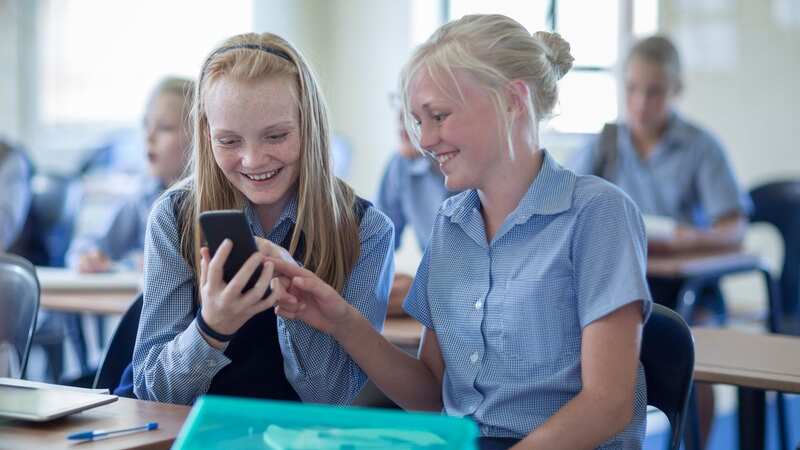Mobile phones to be banned in schools - full plan with rules for teachers too

Children could be stopped from taking mobile phones onto school grounds under a crackdown by ministers.
Education Secretary Gillian Keegan today has published new guidance for teachers on how to enforce a proposed ban on phones in English schools. Headteachers will still get to decide whether they follow the rules, which are not compulsory by law, and how strictly they are enforced.
In a message to staff, Ms Keegan said: “We are determined that all schools should prohibit the use of mobile phones throughout the school day – not only during lessons but break and lunchtimes as well.”
The guidance sets out different options for schools, including a complete ban on mobile phones on the premises, which they are told would be “straightforward to enforce”. Other possibilities include requiring pupils to hand in their phones to teachers before their first class, or asking them to keep them in lockers that they do not have access to during the school day.
Alternatively, teachers are told they could enforce a “never used, seen or heard” policy where pupils are allowed to keep their phones in their bags, but warned they will be confiscated if they are taken out.
 Teachers, civil servants and train drivers walk out in biggest strike in decade
Teachers, civil servants and train drivers walk out in biggest strike in decade
The guidance states that staff should not use their own mobile phones for personal reasons in front of pupils during the school day, and parents should be told they must contact the the school office if they need to speak to their children. Teachers are also advised they must give children lessons explaining the negative consequences of allowing mobile phones, including “loss of focus, classroom disruption and an increase in bullying”.
Heads are told to rewrite their school behaviour policy so it is clear they have a right to search pupils for mobile phones.
Ms Keegan announced the ban on mobile phone use in schools at last October's Tory conference. The Government pointed to official data that showed 29% of secondary school pupils reported mobile phones being used when not supposed to.
But the Association of School and College Leaders said it did not expect the new guidance to make any discernible impact. General Secretary Geoff Barton said that the "compulsive use" of devices was not happening in schools but "while children are out of school".
He said: "Most schools already forbid the use of mobile phones during the school day or allow their use only in limited and stipulated circumstances. We have lost count of the number of times that ministers have now announced a crackdown on mobile phones in schools. It is a non-policy for a non-problem. The Government would be far better off putting its energies into bringing to heel the online platforms via which children are able to access disturbing and extreme content."
The four mobile phone ban options given to schools - in full
a) No mobile phones on the school premises – A school may decide that no mobile phones should be brought to school by its pupils, and they must be left at home or with parents. This policy provides a very simple boundary which is straightforward to enforce as any mobile phone found at school would be in breach of the policy.
b) Mobile phone handed in on arrival – A school may decide that its pupils may require access to their mobile phones before and after school, but they do not want pupils to have access to their mobile phones throughout the school day. On entry to the school each pupil hands in their device to school staff and these are then collected at the end of the school day. Schools should be mindful that even if a pupil has handed in one mobile phone, they may have another mobile phone in their possession.
c) Mobile phones kept in secure location, which the pupil does not access throughout the school day – Some schools may have established bag-free days where personal possessions are kept in lockers, or similar secure storage. If mobile phones are brought to the school, at the start of the school day they should be put straight into lockers or similar secure storage and not be accessed by the pupil until the end of the day.
d) Never used, seen or heard – Some schools may choose to adopt a policy where pupils keep possession of their mobile phones only on the strict condition that they are never used, seen or heard – with consequences for breaching this that are sufficient to act as an effective deterrent. It is important that schools enforce this policy vigorously, consistently and visibly, to the effect that mobile phone use is prohibited throughout the school day. To support this, it may be appropriate for a school to ensure that parents and pupils clearly understand the sanctions that may be applied, to establish a strong no-phone culture. Schools will often stipulate that the mobile phone is switched off at the bottom of the school bag; confiscation may be an immediate consequence otherwise. As this policy becomes established through consistent application, the culture of the school will change, with pupils less likely to attempt to use their phones.
Read more similar news:
Comments:
comments powered by Disqus

































